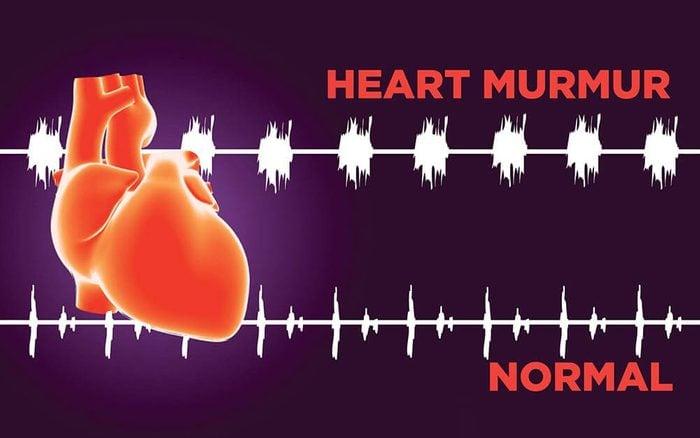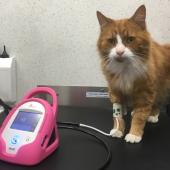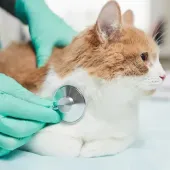Heart murmurs in cats

Understanding what heart murmurs are, their causes, and how they are managed can provide cat owners with valuable knowledge about their feline companions' heart health.
Heart murmurs
A heart murmur is an abnormal sound that a vet hears when listening to the heart through a stethoscope. It can be an indication of heart disease, so other diagnostic tests may be warranted. In young kittens, innocent murmurs are essentially harmless and usually disappear by 4 months of age. To diagnose the cause of a murmur, your vet may recommend tests such as blood tests, chest radiographs (x-rays), and echocardiograms.

What is a heart murmur?
A veterinarian using a stethoscope to listen to a cat's heart will typically hear two noises: a "lub" and a "dub." These sounds are caused by the heart valves closing as blood flows through the heart. A disruption in the heart's smooth blood flow is typically linked to an extra "whooshing" sound called a heart murmur.
Veterinarians assess the degree of cardiac murmur intensity on a scale of one to six, where six is the loudest and one is hardly heard. The same principle applies to a one-through-five rating system as well. These grades are just one method that veterinarians use to characterize the murmur; they do not always correspond with the severity of the cardiac problem.
Although it may not always be a reason for alarm, a heart murmur could be a sign of a cardiac condition. The veterinarian may wish to run additional diagnostic tests to find the source of the murmur, depending on your cat's health.
What causes a heart murmur?
Heart murmurs are caused by any number of conditions that can create turbulence in the flow of blood through the heart. In cats, common causes for heart murmurs include:
- Hyperthyroidism (an excess of thyroid hormone)
- High blood pressure
- Hypertrophic cardiomyopathy (thickening of the heart muscle walls)
- Heart valve deficiencies or blockages
- Defects in the heart walls
- Blood clots within the heart
- Heartworm disease (rare)
- Anaemia
- Severe dehydration
- Infections
What is an innocent murmur?
Sometimes a veterinarian will notice a cardiac murmur in a young kitten.While this might point to the existence of a congenital cardiac condition—a flaw the kitten was born with—it is frequently an innocent murmur, which means that it has nothing to do with a cardiac issue. By the time the animal is four months old, these murmurs normally stop. Your veterinarian might advise diagnostic tests to look into a murmur more if it persists.
What are other signs of a heart condition?
Not every cat with a cardiac issue exhibits symptoms. On the other hand, if you've been informed that your cat has a cardiac murmur, you should keep an eye out for symptoms like:
- Difficult or rapid breathing
- Congestion or "noisy" breathing
- Loss of appetite
- Unexplained weight loss
- Weakness or lethargy (tiredness)
- Collapse
If your cat shows signs of open-mouth breathing or panting, grey or blue gums or tongue, or leg paralysis, seek veterinary help immediately!
Which diagnostic tests will my vet recommend?
To determine the cause of a heart murmur, your vet may recommend a number of tests, such as:
- Blood tests, including thyroid and heartworm tests
- Chest radiographs (x-rays) to assess the heart, blood vessels, and lungs
- An electrocardiogram (ECG)
- An echocardiogram (an ultrasound exam to evaluate heart structure and function)
- Blood pressure tests
How are heart murmurs treated?
The cause of the cardiac murmur and your cat's condition will determine how to treat it. Your veterinarian may decide to observe your cat and administer therapy only if symptoms materialize if your cat is not exhibiting any other heart disease symptoms than the murmur.
When hyperthyroidism or dehydration are the underlying causes of a heart murmur, for example, treating those diseases may totally eliminate the heart murmur.However, your veterinarian can advise surgery if the murmur is the result of a congenital condition. In some situations, the heart murmur might not go away, but drugs can help your cat feel more comfortable and live a longer life.





